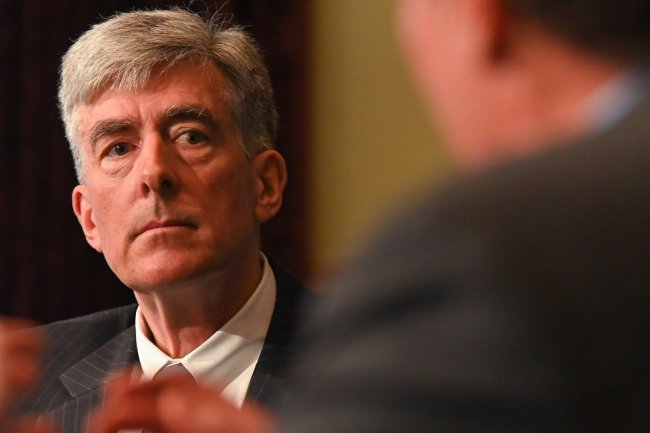‘Super Mario’ Movie and Theme Parks Aid Comcast as Peacock Losses Continue
Company posts higher profit as broadband revenue grows despite customer losses Comcast said it lost 19,000 domestic broadband subscribers in the quarter, less than some analysts had forecast. Photo: Kriston Jae Bethel for The Wall Street Journal By Patience Haggin Updated July 27, 2023 8:09 pm ET Comcast’s studio and theme-park units helped power growth at the cable and entertainment company in the second quarter, while the Peacock streaming service posted another steep loss. The Philadelphia-based company, which owns NBCUniversal, the Sky TV business and Xfinity-branded cable services, said it lost 19,000 domestic broadband subscribers. Those losses were less severe than some analysts forecast, and broadband revenue still increased. The wireless business posted


Comcast said it lost 19,000 domestic broadband subscribers in the quarter, less than some analysts had forecast.
Photo: Kriston Jae Bethel for The Wall Street Journal
Comcast’s studio and theme-park units helped power growth at the cable and entertainment company in the second quarter, while the Peacock streaming service posted another steep loss.
The Philadelphia-based company, which owns NBCUniversal, the Sky TV business and Xfinity-branded cable services, said it lost 19,000 domestic broadband subscribers. Those losses were less severe than some analysts forecast, and broadband revenue still increased.
The wireless business posted solid gains, while the film business was driven by the release of “The Super Mario Bros. Movie.”
Profit increased because of growth in certain businesses and lower expenses in areas such as programming and marketing.
On an earnings call, Comcast President Mike Cavanagh knocked down industry speculation that Comcast might buy a stake in ESPN and enter a joint venture with Walt Disney or swap any of the company’s assets for part or all of ESPN.
Shares were up 6% in Thursday to $45.35.
How were Comcast’s overall financials?
• Revenue grew by 1.7% year-over-year to $30.51 billion in the second quarter, with gains from theme parks, the theatrical business and wireless operations partially offset by declines in areas such as cable TV and advertising.
• Net profit rose 25.1% year-over-year to nearly $4.25 billion, or $1.02 a share. Adjusted net income was up 4.8%. The company reported $3.42 billion in free cash flow, up 8% from the second quarter of 2022.
• Analysts polled by FactSet had expected $30.11 billion in revenue and net profit of $3.98 billion, or 90 cents a share.
• Comcast said that a decline in advertising revenue within Comcast’s residential connectivity business was due to a weak market and lower spending on political ads, while softer ad revenue within its media unit was the result of lower revenue from its networks.
What are the trends in Comcast’s broadband business?
• The last time Comcast lost domestic broadband subscribers was the fourth quarter of 2022, when the company blamed the loss on temporary service disruptions caused by Hurricane Ian. Comcast said it would have added domestic broadband subscribers in that quarter but for the disaster.
• This is the first quarter in Comcast’s history that it reported a loss in total domestic broadband subscribers without the impact of a natural disaster. Its customer loss was less severe than the 73,000 customers that analysts polled by FactSet had expected Comcast to shed.
• The company told analysts that it expects to return to subscriber growth over time.
• Despite the customer losses, Comcast increased the amount of revenue each domestic customer generates by 4.5%. Comcast said in recent quarters that it expected revenue per broadband subscriber, rather than customer additions, to drive growth in the broadband business.
• Continued cord-cutting contributed to a loss of 543,000 domestic video customers. Comcast’s Xfinity Mobile service added 316,000 lines. Xfinity Mobile generated $869 million in revenue, up 20.4% from a year earlier.
What about Peacock?
• NBCUniversal’s streaming service added two million paid subscribers during the second quarter, boosting its base of customers to 24 million, nearly double its total a year earlier.
• Some of Peacock’s subscriber growth came from a policy shift—Comcast cut off free Peacock subscriptions for Xfinity subscribers a few days before the quarter’s end and now requires them to agree to pay for a plan.
• Peacock lost $651 million before interest, taxes, depreciation and amortization in the second quarter, 40% more than its loss in the year-earlier quarter but less than in the first quarter. Comcast has said it expects Peacock’s annual losses to peak around $3 billion this year, then steadily improve thereafter.
• Peacock’s second-quarter revenue increased nearly 85% to $820 million.
Why did Comcast’s content and experiences segment perform well?
• Revenue at Comcast’s content and experiences segment—which is primarily NBCUniversal—rose 4.0% year-over-year. The revenue growth was propelled in part by the successful theatrical performance of “The Super Mario Bros. Movie.”
• Comcast’s theme-park revenue increased 22.4%, with growth at Universal parks in Beijing, Hollywood and Japan.
• Profitability within Comcast’s content and experiences unit rose 7.5% to nearly $2.19 billion in the second quarter.
• Simultaneous strikes by the Screen Actors Guild and the Writers Guild of America have halted the production of new films and TV shows and dried up studios’ spending on content. Cavanagh said that the strikes’ financial impact on Comcast was “manageable” and that it will shift the studios’ working capital “out of the near term and into the future.”
• Cavanagh said the company is committed to reaching a fair deal with the guilds as soon as possible. “For all involved in the industry broadly, a prolonged work stoppage—and the longer it goes, the worse it’ll be—is obviously going to have a negative impact all around,” he said.
What did Comcast say about the ESPN speculation?
• Disney CEO Robert Iger said earlier this month that he is interested in a joint venture for ESPN to help transition it to a direct-to-consumer model, spurring industry speculation that Comcast could swap its one-third stake in Hulu for a stake in ESPN. “That is very improbable,” Cavanagh said. Such swaps or joint ventures come with “tremendous issues,” as well as tax consequences, he said.
Write to Patience Haggin at [email protected]
What's Your Reaction?

















